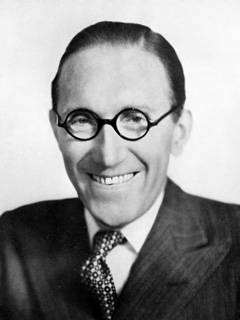Arthur Bowden Askey (Arthur Bowden Askey)

English Comedian and Actor. He is remembered for the playfulness of the characters he portrayed on British radio, film, and the stage, his improvising, and his use of catchphrases, which included “Hello playmates!”, “I thank you” (pronounced “Ay-Thang-Yaw”), and “Before your very eyes”. His father was a secretary of a commercial firm in Liverpool, England. He received his elementary education at St. Michael’s Council School and studied further at the Liverpool Institute for Boys. He was very small at 5 feet 2 inches, with a breezy, smiling personality, and wore distinctive horn-rimmed glasses. He served in the British armed forces during World War I where became an entertainer. After the war he worked as a clerk for the Liverpool Corporation and soon became involved in a touring concert party that performed at music halls. In the early 1930s he appeared on an early form of British Broadcasting Corporation (BBC) television, which was nothing more than a spinning disc invented by John Logie Baird that scanned vertically and had only thirty lines of resolution. He had to be heavily made up for his face to be recognizable at such low resolution. In 1938 he rose to stardom through his role in the first regular radio comedy series, “Band Waggon,” on the (BBC). It had begun began as a variety show, but had been unsuccessful until he and his partner, Richard Murdoch, took on a larger role in the writing. During World War II he starred in several Gainsborough Pictures comedy films, including “Band Waggon” (1940, based on the radio show), “Charley’s (Big-Hearted) Aunt” (1940), “The Ghost Train” (1941), “I Thank You” (1941), “Back Room Boy” (1942), “King Arthur Was a Gentleman” (1942), “Miss London Ltd.” (1943), and “Bees in Paradise” (1944), as well as the popular West End musical production “Follow the Girls,” which opened in October 1945 and ran for 572 performances. When television arrived, his first series was “Before Your Very Eyes!” (1952), named after his catchphrase. In 1957, writers Sid Colin and Talbot Rothwell revived “Band Waggon” format for the British television sitcom “Living It Up” that ran for nine episodes until 1958, reuniting him and Murdoch after 18 years. He continued to appear frequently on British television in the 1970s, most notably as a panelist on the ITV talent show “New Faces,” where his usually sympathetic comments would offset the harsher judgments of fellow judges Tony Hatch and Mickie Most. He also appeared on the comedy panel game “Joker’s Wild.” His recording career included “The Bee Song”, “The Thing-Ummy Bob” and his theme tune, “Big-Hearted Arthur,” which was also his nickname. However, in 1940, a song he intended to record, “It’s Really Nice to See you Mr Hess” (after Hitler’s deputy fled to Scotland), was banned by the British War Office. During the 1950s and 1960s, he appeared in many sitcoms, including “Love and Kisses,” “Arthur’s Treasured Volumes,” and “The Arthur Askey Show.” His later movies included “The Love Match” (1955), “Ramsbottom Rides Again’ (1956), “Make Mine a Million” (1959), Friends and Neighbours” (1959), and “Rosie Dixon – Night Nurse” (1978). He continued to work until just before he was hospitalized in July 1982 due to poor circulation in his legs which resulted in gangrene and he had to have both legs amputated. He died in London’s Saint Thomas Hospital at the age of 82. He was awarded the Officer of the Most Excellent Order of the British Empire in 1969 and Commander of the Most Excellent Order of the British Empire in 1981. (bio by: William Bjornstad)
Born
- June, 06, 1900
- England
Died
- November, 11, 1982
- England
Cemetery
- Putney Vale Cemetery and Crematorium
- England

